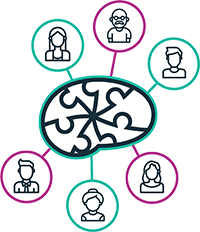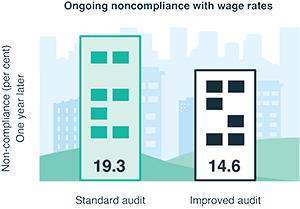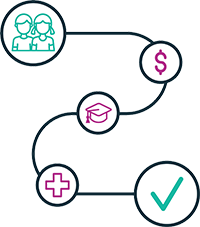
With the New Year (and new decade) well and truly underway, we thought it timely to reflect on the year that was. With 9 podcasts released, 6 blog posts, 11 events, 6 reports published, the launch of our eLearning program and Behavioural Discovery Tool, and numerous team members joining BETA or moving to greener pastures, it was a big year to sum up. In case you missed it, we’ve gathered a few key highlights we thought were worth a mention.
We helped credit card consumers avoid paying ongoing, high-interest fees

We partnered with the Treasury and Westpac to test the effect of reminder messages on people’s credit card repayments. It turns out, for some people who consistently make low repayments, their credit card had become a “set and forget” - leading them to repay only the minimum amount required and incur expensive fees as a result.
An SMS reminder a week out from their next due date helped prompt these consumers to increase their repayments (where they were able to do so) and avoid paying high interest fees. Westpac has since adopted these reminders. A further win for simple, timely, and cost-effective nudges.
We launched our eLearning program on behavioural insights

Interested in learning how you can use behavioural insights to improve public policy? As it happens, so are a lot of people. Instead of just talking ourselves hoarse, we developed an introductory (and free!) online course on the foundations of behavioural insights. There are six learning modules, each with interactive quizzes, and a test with a certificate at the end. You can try our course for yourself or check out our Learn Hub for a full list of resources.
Since launching in March 2019, we’ve had over 1,500 people register with our course, and even made the list of Best Online Behavioural Design Courses for 2019!
We reduced underpayment of wages

The underpayment of wages is a serious issue, so the Fair Work Ombudsman (FWO) regularly looks for ways to improve its audit processes to check compliance with workplace laws. Together, we made small changes to their audit communications and tested them with around 2,000 small businesses. The changes improved ongoing compliance with award wage rates: noncompliance fell from 19 to 15 per cent, and we estimate affected workers were better off by $900 per year. Businesses also found the audits easier to complete, with the time taken falling from around three weeks to about a fortnight. These findings have informed FWO’s subsequent audit communications.
We uncovered effective ways of reaching out to drought-affected farmers

Although there are a number of assistance packages available to farmers hit hard by the drought, not all farmers who are eligible for help are reaching out. We conducted interviews with service providers and farmers to understand why. We found a longstanding culture of self-sufficiency meant many farmers were hesitant to seek help. Our report suggests reframing government assistance as an important part of business sustainability, and delivering messages through trusted members of the farming community, can help overcome some of these barriers to uptake.
We improved government forms

BETA held Australia’s first Form-a-Palooza with over 200 people from across 38 government agencies to help the Australian Public Service get WISER about form design. The event combined behavioural insights training with hands-on workshops for attendees to apply their new skills to five government forms in need of improvement. In preparation for the event, BETA developed a new framework for behaviourally-informed form design: the WISER Framework (consider the ‘who’, introduction, structure, expression, and – repeat!).
Expanding on the WISER framework, and meeting the growing need for behaviourally informed form design, BETA developed a Forms Better Practice Guide.This guide incorporates case studies and examples of form review and redesign, as well as a structured approach to the form design process.
We applied behavioural insights to a social protection program

Social protection programs help tackle the intergenerational effects of poverty. People who participate in these programs receive funds to complete activities like sending their children to school or attending health check-ups. We partnered with the Department of Foreign Affairs and Trade to understand how behavioural insights could help people overcome some of the barriers they may experience in completing these activities. Our research led to diagnosis and design work, due to be tested in the field in 2020 – another great example of evidence-based policymaking.
So, what’s next for 2020?
If 2019 taught us anything, there are still plenty of areas in public policy that could benefit from the application of behavioural insights. From quick pieces of advice, to full scale evaluations, we’re continuing our work to put human behaviour at the heart of public policy.

